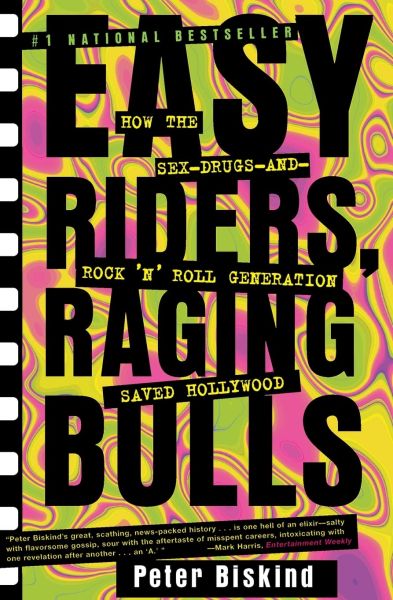Easy Riders, Raging Bulls
I purchased Easy Riders, Raging Bulls, by Peter Biskind, from a local bookstore, one of the last books that I remember purchasing from a brick-and-mortar bookstore. Since then, I get them almost exclusively from the Internet. I can hardly cruise through Wikipedia or Amazon without wanting to stop and look at the books.
The title of the book comes from two important movies, Easy Rider from 1969, starring Dennis Hopper and Peter Fonda, and directed by Hopper himself, and Raging Bull from 1980, directed by Martin Scorcese, and starring Robert de Niro and Joe Pesci. De Niro and Pesci teamed up for later Scorcese movies like Goodfellas and Casino.
In a larger sense, however, the title also reflects the cultural personality of movie-making at that time. Easy Rider concerns two young men, Hopper and Fonda, who make a lot of money in a big drug deal. The late Phil Spector, who spent his last years in prison for murder, played the dealers' rich customer. With their new-found freedom, the two young men ride off into the sunset on their custom Harleys, experimenting in a leisurely way various hallucinogens, casual one-night stands, all the time thumbing their noses at the American Establishment. In the end, they die violently futile deaths, thumbing their noses at their killers. Everything about the film remains topically interesting to this day, except for the drug-use, which has transitioned into another gods-that-fail thing.
Like those two characters, the directors and producers who created the New-Hollywood movies did drugs, experimented outside sexual norms, and thumbed their noses at their elders in the industry, the whole time. Biskind quoted Dennis Hopper:
"Heads are going to roll, the old order is going to fall, and all you dinosaurs are going to die." He argued that Hollywood had to be run on socialist principles. . . . What was needed was an infusion of money to young people like himself.
But in the end, Easy Riders, Raging Bulls tells an unsettling story, mostly with regard to the excesses, anti-American fantasies, and pessimism. It will remind modern readers of the sex-scandals and drug-use by actors and actresses during the thirties, with amoral film-moguls taking advantage of ambitious, young actresses and dancers. In effect, the book reveals that nothing has changed. In both cases, money offers successful people an extraordinary degree of power and protection.
But Biskind's book also allows some of the modern victims a measure of payback. In interviews, the shafted former-associates, the ex-wives and mistreated girlfriends dish out the dirt on their tormentors. They take to task one such tormentor, Bob Rafelson. Rafelson made his fortune as a producer of important movies like Easy Rider, The Last Picture Show, Five Easy Pieces, and King of Marvin Gardens. He worked often with the actor Jack Nicholson.
About Robert Rafelson, Biskind writes:
He was handsome in the Jewish way . . . rosebud lips under a fighter's battered nose. He was tall, thin, and powerfully built. . . . There was an intense brooding quality about Bob, and a cruel, predatory steak that could be attractive.
Rafelson's ex-wife Toby met him when they attended college in Vermont. She said,
"He had that kind of vitality, the ability to take you on his trip, turn you on, which was very compelling. He was kind of a 'bad boy', a trouble-maker which . . . made him extremely provocative."
Rafelson made several movies with Bert Schneider who, like Rafelson, was Jewish:
Rafelson and Schneider considered themselves . . . sexual outlaws for whom nothing was taboo, nothing too flagrant. . . . "Bob was a role model for drug-taking and promiscuity. He had a group of young people who adored him. I think a lot of young lives were harmed by Bob Rafelson."
The girlfriends of the New Hollywood directors had a curious response to their sexism:
On any given weekend, Jennifer Salt found herself cooking for DePalma, Spielberg, Boyle, and so on. Recalls Salt, "I was always thinking, 'Should it be chili and three-bean salad and the cheesecake?' . . . The reality was that we always got the drugs and we always got the food. . . . There was a real contradiction in what we perceived ourselves to be doing and what in fact we were doing."
Hopper, Rafelson, and Schneider all pursued a left-wing agenda in politics. Sexually, they pursued a somewhat different sort of agenda. President Trump has pursued a right-wing agenda and, in the past, a somewhat different sexual agenda. Women in America should realize that sexual politics differs somewhat from social or military politics. If they want America's leaders to toe the line sexually and act responsibly, they have only one recourse, to maintain the leadership of the Constitution.


